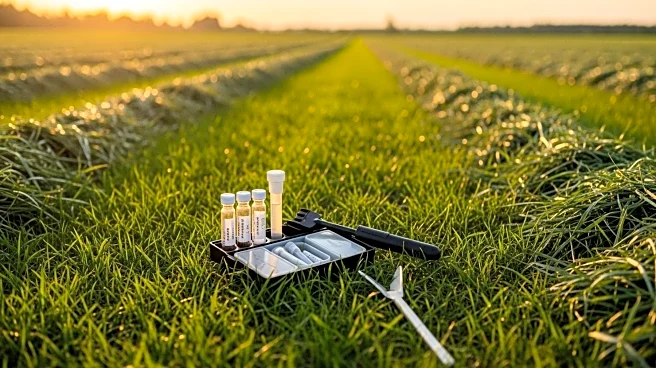What is the story about?
What's Happening?
Post-harvest soil testing is a crucial step for farmers to prepare for the next planting season. These tests help identify the nutrient composition of the soil, including organic matter, cation exchange capacity, and pH levels. Understanding these factors allows farmers to make informed decisions about soil amendments and crop planning. Nitrogen, phosphorus, potassium, calcium, and magnesium are key nutrients often assessed, with recommendations for organic amendments like compost and manure to improve soil health. The tests also guide farmers in managing nutrient deficiencies and preventing overapplication, which can lead to environmental damage.
Why It's Important?
Soil testing is vital for sustainable agriculture, as it helps farmers optimize crop yields while minimizing environmental impact. By understanding soil nutrient levels, farmers can avoid overusing synthetic fertilizers, which can lead to runoff and pollution. This practice supports healthier ecosystems and reduces costs associated with excessive fertilizer use. Additionally, informed soil management can enhance crop quality and resilience, contributing to food security and economic stability for farmers. The insights gained from soil tests are essential for adapting to changing environmental conditions and maintaining productive agricultural systems.
What's Next?
Farmers are encouraged to conduct soil tests regularly and consult with local extension offices for guidance on appropriate soil amendments. As environmental concerns grow, there may be increased emphasis on organic and sustainable farming practices. The integration of technology in agriculture, such as sensors and remote monitoring, could further enhance soil management strategies. Farmers may also explore cover cropping and conservation tillage to improve soil health and biodiversity. These practices could become more prevalent as the agricultural industry seeks to balance productivity with environmental stewardship.
Beyond the Headlines
The shift towards sustainable soil management reflects broader trends in agriculture, including the adoption of regenerative practices and the focus on long-term soil health. This approach not only benefits individual farmers but also contributes to global efforts to combat climate change and preserve natural resources. As awareness of soil health grows, there may be increased investment in research and development of innovative soil management technologies. The cultural shift towards valuing soil as a critical component of the ecosystem could lead to new policies and incentives for sustainable farming.
















